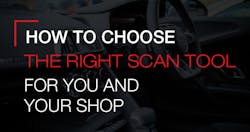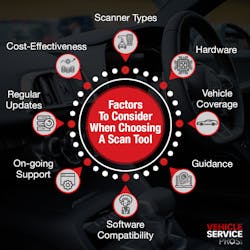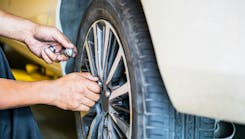What you'll learn:
- Why making the right choice is so important
- How to assess the vehicles you service
- How to compare tools on the market today
Many technicians find it hard to choose from the many options of scan tools available to them in the market. Are you one of them?
If so, you can use our enlightening guide to make a quick but smart choice. You’ll not only know how to choose the right scan tool for you and your shop, but also WHY you should.
Who knows? You could discover an important aspect of the diagnostic tool industry that was overlooked in your earlier thought process.
Several aftermarket scan tools can perform most of the functions of factory scan tools. Nonetheless, even top-rated products can’t offer all the functionality needed. This has made many independent shops obtain more than one scanner for certain purposes. The execution of some tasks may only be possible with the utilization of factory scanners.
Factory diagnostic tools have been undergoing constant development over the years, just as have aftermarket scan tools. Several vehicle makers are offering subscription-based models of their scanners with J2534 Pass-Thru device compatibility.
Download the PTEN 2021 Scan Tool Spec Guide here to help you make your next scan tool purchase.
Technicians in independent garages can now utilize the same generic J2534 device that’s being employed in the reprogramming of modules to also access factory level scanners. You’ll find several of them obtainable through short-term subscriptions.
Some vehicle makers have switched from the provision of software applications that can be downloaded on a mobile device or PC to cloud-based technology that requires internet connectivity. You’d have to subscribe to the service to benefit from it, of course. This has become especially common for manufacturers of EVs (electric vehicles).
The security of on-vehicle data (crucial on-board systems) is a matter of increasing importance. Concerned automotive manufacturers have started taking innovative steps to implement solutions. They’re doing this by transforming technologies that could be utilized in accessing vehicle networks. The introduction of upgraded cloud-based diagnostic tools is one of the results of their efforts.
Choose the right scan tools for your shop to ensure that customers’ vehicles, especially the most recent models, are effectively repaired,. Modern vehicles have a great number of reflashing and diagnostic requirements. You can expect producers to keep adding more of them to newer models. With this in mind, it’s only right that you seek to upgrade your scan tools regularly or get more suitable ones to meet up with the latest standards.
Some products work only for certain vehicles. Be sure about what you’re getting so you can choose the best diagnostic tool or combination of diagnostic tools for your garage.
As Donny Seyfer, former co-chair of the tool and equipment committee for the National Automotive Service Task Force advised, shops will need scan tools for contrasting reasons. This is why you should have a complete knowledge of the functionalities your shop would require from the product(s). See the steps in selecting the most suitable scanner for your garage below.
What vehicles do you service?
Make a list of the vehicle makes, models, and years you work on. Your decision-making process will be easier if your scope is narrow or if you specialize in one type or few types of vehicles.
What vehicles don’t you service?
This second criterion can be thought of in place of the first. However, there’s another approach you can take in answering the question…
Knowing which vehicles you don’t repair (and why you don’t repair them) can aid you in discovering which vehicle could incorporate into your service range. After all, you’re always trying to have more ways to generate revenue, right? You could decide to get a scan tool that lets you service additional vehicle makes.
Do your research on various shopping criteria
Your research will be based on the following factors:
Product Types/Categories: Find out the advantages and disadvantages of the type or category of scanner you need:
- Code readers
- OBD I
- OBD II generic
- OBD II generic with enhanced data
- Factory tools
Hardware: Seek information about diagnostic tools that are compatible with PDAs (personal digital assistants), smartphones, and PCs— and don’t forget those that come with their dedicated hardware.
Vehicle coverage: It’s important to know the range of vehicle makes and models that the tool is compatible with. What’s the extent of its functionality and what type of data can it produce?
Guidance/Usage: Will it be easy to learn how to use the product? What kind of training is required, and how long will it take? You should also research what’s needed to make the scanner work.
Software compatibility: Details about software compatibility is important whether for PDAs, PCs, tablets, or smartphones. Operating systems like Windows, Mac, Android, iOS, and so on will come to mind.
Ongoing support: Find out if the manufacturer of the diagnostic tool has a technical support hotline that mechanics can call. Such a feature might be useful when you encounter difficulties in using the scanner or want to make inquiries.
Regular updates/upgrades: Tool makers that offer constant updates and upgrades should be on your checklist. Their products will keep getting better and better over time.
Cost-effectiveness: Think of affordability in terms of purchase price and regular updates/upgrades.
What value can the scan tool offer to you and your shop?
In other words, what will be the ROI (return on investment) for buying the diagnostic tool? Compare the purchase price plus subscription and upgrade fees to the money that you may get from charging customers for scans. This will give you a minimum estimate.
Test the product
Testing the diagnostic tool is the best way to be sure that it’s the one for you and your shop. You’ll be able to see the complete functionality the brand is offering and compare it to the range of vehicles you service. It will be great to see a manufacturer or seller that lets you demo before making a purchase.
Utilize the tool appropriately and strategically
This should be done after buying the scanner to make the best use of it. Follow the instructions in the manual, undergo training, seek advice from experts and on forums, etc. The next thing would be to market your shop’s diagnostic know-how to potential customers effectively.
Final thoughts
When it comes to recommending a scan tool, one diagnostics expert says that there’s no one answer for any workshop. They advise technicians to make the decision-making process as easy as they can for themselves by researching and testing the products before making a purchase. Don’t just go for the flashy, pricey, or cheap scanners—but the most suitable ones.





